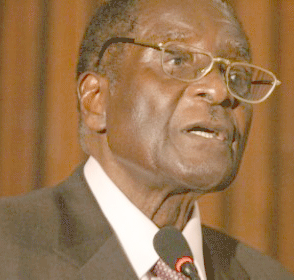
BEIJING — President Robert Mugabe was expected to meet his counterpart Xi Jinping in China yesterday after being invited to visit, weeks after he was snubbed by United States President Barack Obama at a summit of African leaders he hosted in Washington.
Mugabe (90), may use Xi’s invitation to seek economic aid and a rescue package as his country’s economy slows, as well as infrastructure funding for the Southern African Development Community (Sadc), which he is now chairman of.
Leader of Zimbabwe for 34 years, Mugabe’s seizure of land owned by white farmers and a series of elections marred by violence and irregularities have made him a pariah to governments in the Western world.
It has also undercut the country’s ability to borrow from global institutions. Yet China has long maintained close economic and diplomatic links, with Vice-Premier Wang Yang visiting the country in May 2013 on a two-day official visit.
“Mugabe’s trip to China is to seek a last financial lifeline for his regime,” said Martyn Davies, chief executive officer of Johannesburg-based Frontier Advisory, which provides research on emerging markets.
With China reforming its State-owned sector, Mugabe’s party would be “naïve to assume that Chinese capital is as easy to get as it has been in previous years.”
Mugabe will seek a $4 billion rescue package to stabilise Zimbabwe’s faltering economy, the Zimbabwe Independent reported recently.
Finance minister Patrick Chinamasa visited China in January and was told to come up with a fundable working plan to present to the authorities, it said.
- Chamisa under fire over US$120K donation
- Mavhunga puts DeMbare into Chibuku quarterfinals
- Pension funds bet on Cabora Bassa oilfields
- Councils defy govt fire tender directive
Keep Reading
Zimbabwe’s economy is threatened with recession as factories shut, consumer spending slumps and deflation takes hold.
Economic growth, which averaged 10% between 2009 and 2012, is forecast at 3,1% this year, according to the International Monetary Fund.
Mugabe, who is subject to US sanctions, was one of four African leaders not invited by Obama to the Africa summit earlier this month.
The others were Sudanese President Umar al-Bashir, who is wanted by the International Criminal Court for war crimes and leaders from Eritrea and Central African Republic.
In April, Zimbabwe boycotted a European Union-Africa summit after Mugabe’s wife, Grace, was denied a visa to enter Brussels.
Still, Mugabe won an endorsement from his fellow Southern African leaders this month when he was named head of the 15-nation Sadc.
Mugabe will “discuss infrastructural projects” with China that “add value” to regional products, he said last week at the end of the group’s annual summit in Zimbabwe’s resort town of Victoria Falls.
He is in line to lead the 54-nation African Union from 2015.
“Since countries in the region and the regional organisations endorse Mugabe and his legitimacy, China certainly does not stand alone or feel vulnerable,” Yun Sun, a fellow with the East Asia Programme at the Washington-based Stimson Center, said in an e-mail.
China has long viewed Mugabe as an African liberation leader for his role in Zimbabwe’s independence and supporting Western-style democracy in Africa is not a goal for China, she said.
Mugabe’s chairmanship of Sadc means he has great influence over the agendas of regional organisations, which China would like to participate in as much as possible, she said.
“Mugabe is a good friend of China,” He Wenping, director of the African Research Section at the Chinese Academy of Social Sciences, who visited Zimbabwe in May, said.
“In Zimbabwe they are talking about a ‘Looking East’ policy.
“They’re not only looking for money, they’re also looking for development experiences and for friends.”
Zimbabwe has the world’s biggest reserves of platinum after neighbouring South Africa.
China Power Investment Corp may buy a Rio Tinto Plc coal mine in Zimbabwe and build a thermal generator that would double the power-starved country’s capacity, Chinamasa said in March.
Trade between the two nations has more than doubled to $1,1 billion between 2010 and 2013, China’s ambassador to Zimbabwe, Lin Lin, said in an editorial published on August 22 in The Herald. China’s investment in 2013 was $602 million, he said.
South Africa has in recent years replaced Zimbabwe as Beijing’s key ally in southern Africa, said Davies.
“Geopolitics may underpin the relationship, but Chinese firms are also increasingly risk averse,” said Davies.
“But considering Mugabe’s chairmanship of Sadc and China’s intention to gain access to regional infrastructure projects, this may bolster his hand somewhat.” — Bloomberg News










